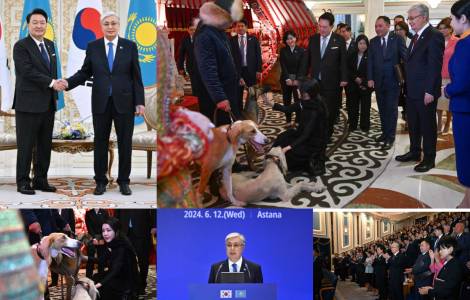
(Astana Times- Akorda)
Seoul (Agenzia Fides) - After the summit with African countries on June 5, during which investments in the continent amounting to 24 billion dollars were announced, South Korean President Yoon Suk Yeol made a tour in Central Asia between June 10 and 15, meeting the heads of state of Turkmenistan, Kazakhstan and Uzbekistan. Alongside Yoon's visits, economic summits were organized between Korean and local companies, which resulted in the signing of different memorandums: as in the case of the summit with African countries, the objective was to sign trade agreements in order to gain access to the region's raw materials, crucial to Seoul's semiconductor industry.
What South Korea can also offer to countries in this region is its technological capacity and, as in the case of Africa, a series of investments in other strategic sectors for local economies.
But technology and raw materials are not the only aspects South Korea is focusing on: health, education and people-to-people exchanges are on the diplomatic agenda, as are ties between local and Korean companies. All of these elements are part of the so-called “Silk Road Cooperation,” Korea’s action plan with the five Central Asian countries. The next step in the development of the initiative will be the organization of a summit in the “5+1” format, a format used by other countries and organizations interacting with the entire region, in 2025, as declared by President Yoon. For South Korea, this is a renewed approach to Central Asia: for a decade already, different plans for relations with the region have followed one another. The first meeting in the "5+1" format was held in 2007, but it was only at the vice-ministerial level, before becoming a summit of foreign ministers in 2012. The following year, the then Korean President Park Geun-hye, launched the "New Northern Policy" (NNP), which aimed to reduce Korea's dependence on marine logistics routes and attempt to integrate it into the trade of the Eurasian continent through economy, energy and transport - in the intentions, the NNP was to be combined with the New Southern Policy (NSP) which was to act in the Indo-Pacific context - this region remains of great interest for Seoul, as evidenced by the summit with the Pacific countries held last year. President Park's successor, Moon Jae-in, then developed the NPC starting in 2017. It was under his presidency that the Korea-Central Asia Cooperation Forum was established in 2017 and 2020 was declared the year of “Northern Economic Cooperation”, which included cooperation with Central Asia. Over these years, the Forum, which serves as a diplomatic platform, has defined six medium and long-term objectives, some of which were discussed during last month's meetings in Yoon, to which should be added climate change, education and medicine. In 2023, political contacts were strengthened with the creation of an interparliamentary forum between the six countries.
An important change from the past is the geopolitical component of Korean action in the region. In recent years, all actions have also been linked to the resumption of contacts with North Korea. We must not forget that South Korean President Moon met with Kim Jong-un in 2018, and that certain choices were made in Central Asia in order to involve Russia in this process. Two projects in particular were relevant: the Trans-Korean Railway which was to start in South Korea, run through the North and reach the center of the continent, and the Greater Tumen Initiative (Gti), a regional cooperation mechanism which included South Korea, China, Russia and Mongolia. With the current major geopolitical upheavals, some of these paths cannot be taken, and the question now is whether South Korea will attempt to follow a regional strategy separate from that of its allies, notably the United States, or whether it will align with them. (CG) (Agenzia Fides, 16/7/2024)